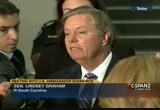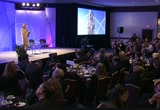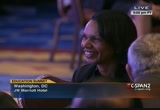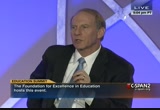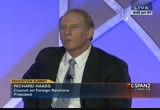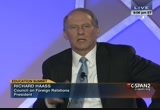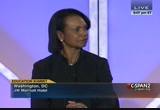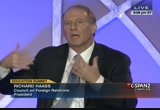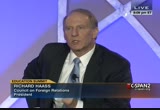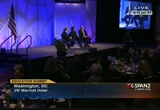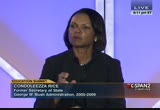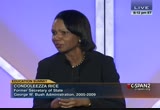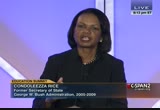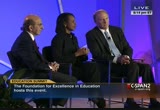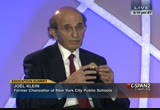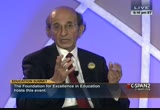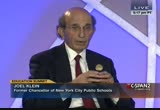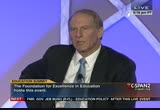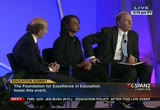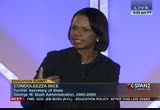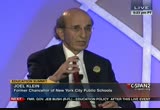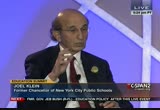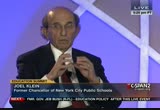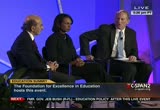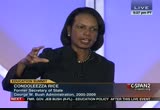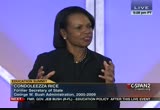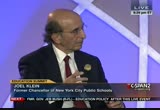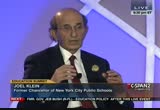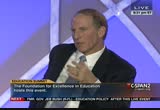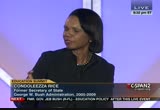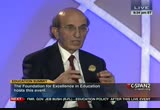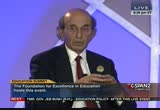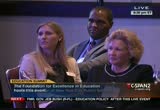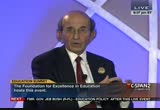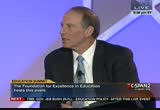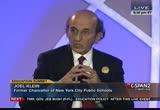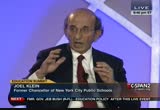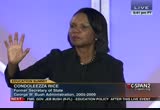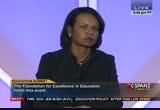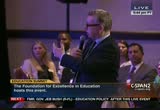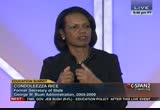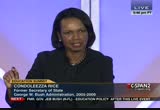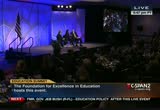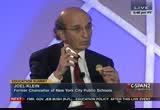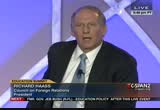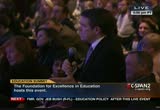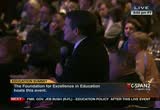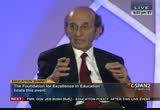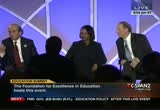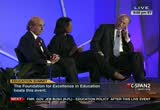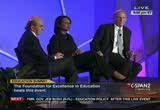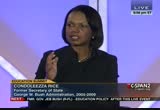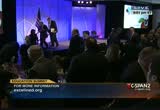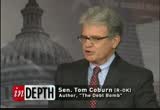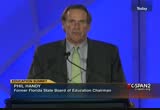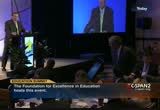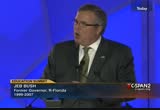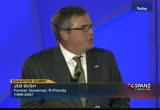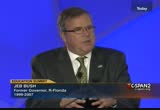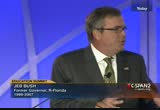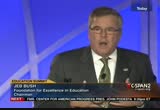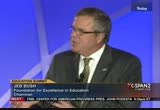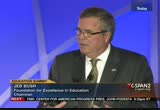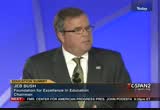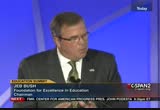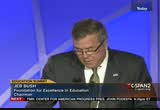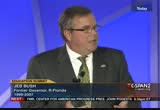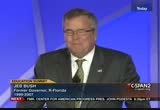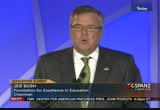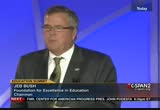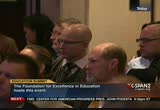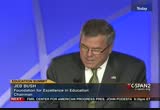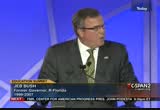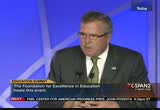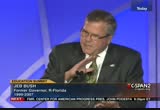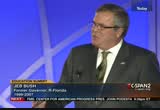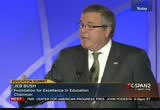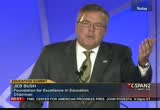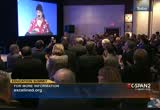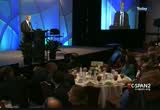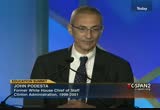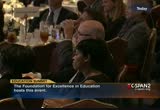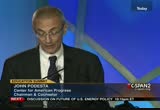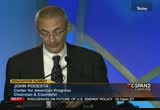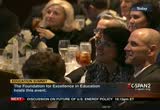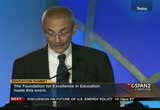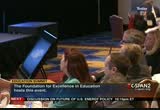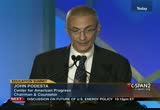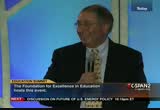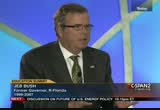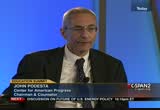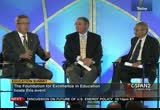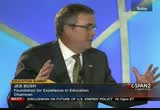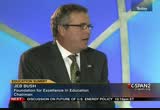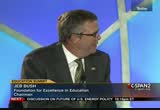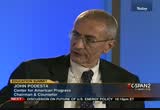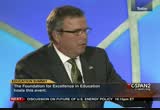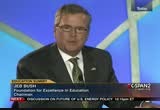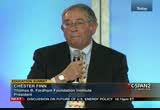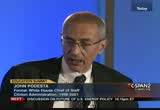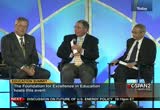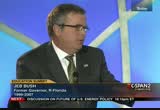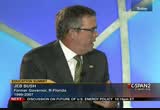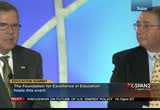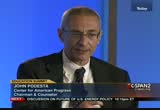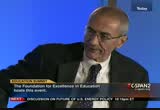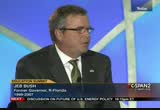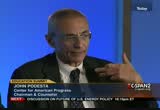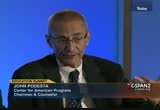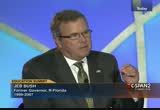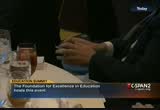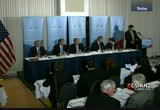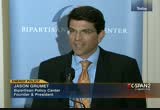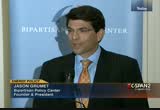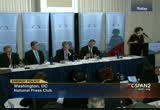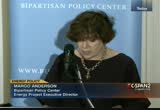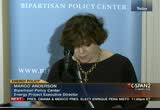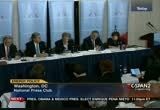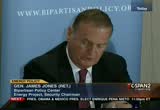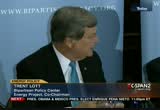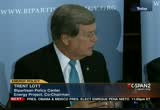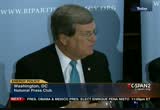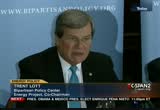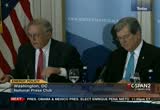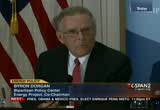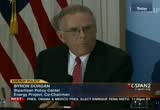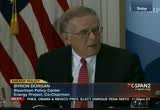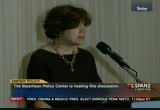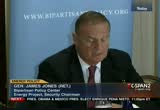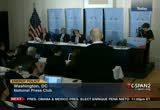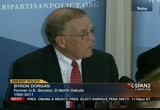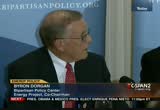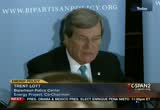tv Tonight From Washington CSPAN November 27, 2012 8:00pm-11:00pm EST
8:00 pm
the united nation's reviews much more than that. i [inaudible] >> before anyone can make an intelligent decision regarding someone involved in benghazi, we need to do a lot more for the state. we don't have the fbi interviews of the survivors one or two days after the attack. we don't have the basic information about what was said tonight at the attack has been shared with congress says that this day. so i remember the episode pretty well. our democratic friends thought like john bolton didn't have the information needed to make an informed decision qualification. john bolton the ambassador and democrats talk in their fields saying we're not going to vote, not going to consider this nomination until they get basic answers to our concerns.
8:02 pm
>> we are now live with condoleezza rice and former chancellor of new york city public schools. they will discuss america's education system and its impact on security. it is part of a event hosted by the excellence in foundation for education. right now we are listening to introductory remarks. >> the first african-american woman to hold that post. she's a former national security advisor under president george w. bush. she is also the cofounder of the center for a new generation, which is an innovative afterschool enrichment program, and she is the co-author of numerous books, including two bestsellers. she is an undergraduate degree from the university of denver, a masters from notre dame, and a phd from the university of
8:03 pm
denver. mr. klein and doctor rice are going to be discussing a report that they have authored, which has been published in march of this year by the council on foreign relations. among many things, this report notes that while the united states invests more in k-12 public education than many other developed countries, students are woefully ill-prepared to compete globally. one tidbit according to the results of the 2000 my program for international student assessment, a tool that measures performance of 15-year-olds in reading and math and science every three years, the united states students ranked working been reading 25th in math and 17th in science. the lack of preparedness poses stress on five national security funds. our economic growth and competitiveness and physical
8:04 pm
safety and intellectual property and u.s. global awareness and cohesion, please join me in welcoming the panelists to discuss this disturbing an important report. [applause] >> thank you. >> you can sit next to me. [applause] e-mail welcome to this evening in the broadcast of morning joe. the energy in this room is a real testament of two things.
8:05 pm
one is how this issue of education reform has been a combination of talent that we see in this room and how it has coalesced around this issue of new technologies. that there really is a sense that the moment has arrived and the other is jeb bush. [applause] >> i'm a great believer that two things matter. one is ideas and the other is people. that is the real driver of change. it is the driver of history. this includes the coming together of a person with real talent and drive. this is one of them. so again, the fact that you are all here is the greatest.
8:06 pm
condoleezza rice and i come out of the national security background. when we were youngsters, we used to mess around with iran bomb calculator. and he used to calculate what was known as the circular error probable of the blast effects of nuclear weapons. here we are today, we have traveled a considerable difference. we have traveled a considerable distance. they didn't say al qaeda or iran or north korea, what he said was the debt and deficit. i think that is exactly right. above all, this is the future. we are not talking about a physical infrastructure, we are talking about our human
8:07 pm
infrastructure. joel klein is someone who has dedicated the most recent date of his multifaceted career to this. when he is in discovering the best restaurants in brooklyn, he is focused on improving the lot of young people in this country. mostly the other way around. some going to tell you about the time he has dedicated to this issue. about a year and a half ago, i called a condoleezza rice and i said i wanted to do something with me. and i said richard, don't even go there, and i said okay. and so i said before the end of this conversation, you are going to agree to what i'm going ask to ask you. and she said, no way. i said right.
8:08 pm
we spent a lot of time on all the traditional foreign-policy issues. we are focused on being domestic and what we want to do is report on education. we don't want a piece on everyone else has done. what we want to do is look at education through the filter of national security, and basically asked the question, what is the relationship between the challenges about k-12 education and national security of the united states. in turn turn didn't turn out to be a terribly hard thing. she was there. and they cochaired the task force report. the version of this commission. the whole idea of this group in this background, educators and also those who come together in
8:09 pm
the seam states and say, they raise the question about what is the relationship between the educational challenges we face in the national security challenges. to recap this issue, it is always the fact that it reflects the fact that you are here at the risk of being redundant. but what we wanted to do is get people who are interested in foreign affairs rather than the chronicle of higher education. what they have done, the two of them, they have helped put on this report. it's on cfr.org.
8:10 pm
they don't just resolve everything, but they put the issue center stage. let me just turn to them and deal with the basic questions. is there a close link? between the state of k-12 education. >> thank you very much. indeed, i was delighted. we were prepared to look at what i call the domestic forces of american strength because without the strength at home, we don't lead abroad. secondly, i was looking forward to the opportunity to work with joel, who i have gotten to know and who i admire so much for what he did in your city and
8:11 pm
continues to do. it really was a great task force. i would just make three brief points about this link that i think that we all found between education reform. first of all, the one that is most evident when you hear some of the statistics that are mentioned, global competitiveness is at stake. that is generally where people go. eventually you will lose the innovation rate and you will not be able to educate people for the jobs that are available. both jobs will go elsewhere, global growth and competitiveness. that is the most obvious wink. we are not preparing people for the workplace. we are not going to be the world's most innovative economy. second, in some ways, more surprising for me, it was
8:12 pm
brought to us by the former chief of secretary of the army, who talked about the problems in our education system and the relationship to the armed forces. the inability of some 70% of americans actually qualified for service in the armed forces ought to be a red flag for anyone. now, yes, there are other reasons for that. incarceration, obesity, but a fair amount of it is that the people can't pass the basic skills test to get into the military. so just imagine a country -- a developed country, a powerful country in the world. and we can't get the basic tasks. analyzing data secretary of state is realizing how few people how -- how they learn
8:13 pm
foreign languages, the fact that we don't have people who are prepared to go into the intelligence agency and we are lobbying ourselves appellate in literally the national security infrastructure of the country. so most importantly, it is a tragedy that people will not be prepared for a good job and will therefore have nowhere else to go. it is a tragedy that people can't serve in the armed forces armed forces or the foreign services or the intelligence agency. the united states of america is held together by a great national creed. not by ethnicity or by blood. not by religion. our national creed is an aspirational narrative that it doesn't matter where you came from, matters where you're going. you can come from humble circumstances and you can do great things.
8:14 pm
the only way that that is true is if you have access to high-quality education. if it ever becomes a case as increasingly as it is now, as i've said many times, but i can look at your zip code and i can tell whether he will get a good education, and the social fabric of this country has no chance to pull together. and we will be pitted one against the other. those that are capable and those who are not. those who are employable and those who are not. and i can assure you that you might not be able to control your circumstances, but you can control your response to your circumstances. and that will no longer be the way that americans think about themselves or about each other. and that is a way to agreement and entitlement. so to me, the real problem for us in national security is not
8:15 pm
competitiveness abroad, it is not just our institutions and national security, but this great national narrative, this cohesion that has made us the country that we are. [applause] >> let me just say that the words she said are some of the most important word this country has to here. one of the things that bothers me enormously is we just went for a presidential race and we didn't hear those words. we heard it in your speech and in a few other places. but those words were not part of our national debate. yet, when you think about the fact that the glue that holds this country together called the american dream is likely to become, if we don't change course rapidly, the american memory, it is a powerful notion,
8:16 pm
and i give condoleezza rice a credit because i had known her very casually. one meeting she said, you don't understand. you think this is an education and even an economic issue. this is america's national security issue. and she had the foresight to bring the council here. and i thought that was important because most of the people in this room, they wouldn't be here. but we are an echo chamber and we talk to each other and we feel smug about the fact that we understand that. but we are not remotely transforming the country. i found a luncheon discussion today important. we don't have the time to really nibble around the edges. as we speak right now in america for the first time, we are raising a generation that is going to be less well educated than their parents were at a time when we need to raise a generation that is much more well educated and where we can
8:17 pm
predict the educational outcomes based on zip codes that correlate with race and ethnicity. in which there is no other issue that is more important. we want to resolve that issue. today, in cities like new york and chicago and detroit, and also elsewhere, kids are being condemned to a life that is going to be very humbling and frustrating. because i know for a fact that those children are not going to be able to read, they are not going to be able to compete, they are not going to make it up from a miraculous way. so having this twist of focusing on national security may leave this country to understand if we don't get off the path we are on, we are on a path to a very
8:18 pm
different kind of america. we need to give a great deal of credit to secretary rice. [applause] >> you know, let's talk for a minute about what it would take to close the gap between where we are and where we want to be. one way to think about it is the basic skills. one thing we have decided is that also there is a larger context. one is when i taught at the kennedy school, i was stunned that the non-american students do a lot more about the basics of american basics history than the americans. that is one thing that caught me off guard. the other was when i spent time
8:19 pm
with a young man who graduated in computer sciences and asked what he studied the young computer issues. i was shocked that he could graduate from this amazing university and he hadn't had one economics course or history course. it led us to say, okay, we are going to start producing at the council and core courses that high schools and colleges can use to try to close this gap between what it is children know and what it is they need to know in order to be ready for this world. they'll like it or not is going to fundamentally affect their life. what is your sense for? because you come from an educational background. condoleezza rice comes from another background. what is your view to fix the
8:20 pm
problem? >> well, i come from a national security background but i also see the product of the educational system, if you will, it gives me perspective on what it is we need to try to achieve and obviously, we need to see the best. but i will tell you two things. number one, if you have low expectations of even the best students, they will live down to them. [applause] so i come at this with the belief that the most important things, the most weird thing is that whatever you are teaching them, you have to have very high standards. frankly, i am not much for the self-esteem movement. [laughter]
8:21 pm
[applause] i am a musician myself and i think that the arts are important and how many of these little performances have we been to where it is just running all over the stage, it will be better if they know something. [laughter] so my first an important point is high standards whatever you teach them. also, i do believe that the common core, which we talked about in the report, has a chance to give his grounding not just in the substance of knowledge, the ways of acquiring knowledge that students need to have now. i believe in stem. i would like to be able to have them write well. that is an undervalued skill, particularly these days. [applause] i think it would be very useful
8:22 pm
if some civics education were included. but the most important thing is whatever we are going to do, we need to do it in a common way. the country, and i mean the united states of america, has to have a sense of what all kids are going through as far as a skill level, which is like a common core is a good idea. it does not mean that we don't have local control of education and the space is obviously the place where this is going to get done. it does mean in a highly competitive and highly mobile labor pool, alabama and california and texas and vermont have some sense that their kids have a common basis of
8:23 pm
knowledge. so since they came up with the national governors association, i would hope that we could have more discussion. >> i agree. michael gold is really doing a lot of work in the united kingdom. he got all excited. in the k-12 system, it goes to the heart of it. there is this deep belief that we need to develop acute self-esteem so we can perform. we need to do is tell people we need to do that to have self-esteem. because we get that right, that will be great.
8:24 pm
they are not easy to achieve, but if i could wave a wand i would make k-12 teachers america's heroes. they would be the profession that we all aspire to, they would be places like japan where they call their teachers sensei and you can feel the difference between we view those in america and those in other countries. we have decided to unionize rather than professionalize. when you do that, but you end up with is creating this in k-12. a lot of people disagree. i think that choice is critical. it is that fundamental backbone
8:25 pm
of the report. no one in this room would voluntarily agree to send their child to school in dc. no one in this room would send their kid randomly to a school in washington dc. he would move and go to a private school. but you would not just a that i am i'm down with that. on the other hand, whose kids go to the schools in new york? they were called other people's children. as long as we send other peoples children to schools that we won't send their own children into, shame on us. the way out of that is choice. [applause] you think about k-12 versus postsecondary, we have a lot of problem with postsecondary. people from all over the world come to america to look at her postsecondary schools. nobody looks at her k-12
8:26 pm
systems. they are not a monopoly provider. we are going to continue to hobble along. the third thing i think is a word about it for the first time when i was trying to take a broken system and create an effective system. we have to empower teachers and engage our students and change the whole process. neither do those things is important. [applause] >> we are looking at the whole question of education and security. what is your sense of the proper place for language training? will point out to be introduced
8:27 pm
and what degree should it be a priority? where should it be? where should it fit? >> i am a proponent because learning languages earlier is easier. if you've ever tried to learning language of 35, you know what i mean. it is easier if you're younger. it's like music. i would hope that we, well, firsti would like to make sure that they can read and write in english. too many of our children can do that. but one question is whether there is some way to spread the task of some of the things that are kids need to learn. we may not be able to do everything in the schools. i have been very active with the boys and girls club, and we have started called the center for generations in redwood city.
8:28 pm
and it is a high-quality afterschool and summer program for kids three hours after school. they get language languages there and they get some of the things that may fit into the school day. as chul reminded me, we have the shortest learning day and shortest learning year in the developed world. i doubt that we're going to be able to extend the learning day in most places, you know, i learned to speak french, but i landed at age nine. but not in the schools. i learned it because my father, who is was a presbyterian minister, decided with my mother that all educated children should speak french. and so on tuesdays and thursdays and saturdays, we were dragged down to the church to take
8:29 pm
french who was the french teacher from high school. so there may be some ways to add it to the curriculum outside of the school system. >> one thing i have learned, but combat is anything, i want to come back as a son of a presbyterian minister. [laughter] i have been so shortchanged in life. [laughter] thinking about what good it did. [laughter] playing the piano, speaking french, when he first called me about this from you said something that struck me. we live in such a different world. our troops by and large are clueless about this. it's not just the language. these kids know a lot about the
8:30 pm
middle east and china. if you came to the average high school in new york city and us kids about what is happening, it would take your breath away. i really think so. this is a very serious problem. something that is one part of it. the second part, why i think technology matters, is because we don't have to limit the school day anymore. there is much more that we can do. i have watched people in sweden. they have managed to create order in ways -- and i met a kid whose mother was a nurse and one day she had to take the child with her.
8:31 pm
you know, one of my heroes had a big idea. and that was we are failing with what we do with their kids. and we all go home at 3:00 o'clock. there has to be a way to think differently about the dimensions of this challenge. i think technology is part of that. but i want to go back to where we started. kids who can't read or do basic mathematics, higher order or critical thinking, we have got to figure out how to build the foundation and then build on the foundation. right now, tragically we are not doing either. >> you begin by pointing out the fact that many measures in the united states versus other countries, we are falling
8:32 pm
behind. thirty or 50 years ago, we went a lot higher. what is it that others are doing better? what is it that we can learn an important year for mothers? >> well, let me answer that. i think one thing is joel's point. the way that this is treated, the people who go into the profession, the trading that the people get, i think that there are real problems with education in the way that teachers are trained. [applause] one thing that we can look at is how the profession is treated in other places. secondly, the standard issue is a major one. one thing that i learned is that
8:33 pm
we are learning in grade three you what our kids are learning in grade five. why should that be the case. we obviously are not having high enough standards. there's a lot we can learn from others, but we are not china and we are not singapore or finland. we are a big and diverse, very competent country. one question that we ask is what can we learn from ourselves and other parts of the educational system that are more successful. the universities in this country, the colleges across the board, they are the gold standard international. what do they have that the k-12 system does not have? first of all, they have competition. [applause] that is why i'm also a major
8:34 pm
advocate of school choice. secondly, they have variety. it is not one-size-fits-all. you can go to a big research university, a small one, a liberal arts college -- there is variety. what are some of the sources of american universities that can be imported. that can be the biggest problem. so i think that there are things we can learn from others. there is also a lot we can learn from ourselves in other areas that are more successful. >> it is still important. >> we still believe or want to
8:35 pm
believe that marriage matters. it's not who you are, where the talents or challenges they that you face. the second thing is the dynamism. there is no place in the world that innovates like america does. someone asked me what it is about an education, and it's hard to tell. there hasn't been any in such a long time, we can even capture it. if you think about the dynamism, if we infuse those in our k-12 system, and that goes to the schools which in finland, whatever the comparison, for every 10 people apply, they except one person. for every one person that applies in america, they take 10 people. what they are doing is really important. but i would say is we are going
8:36 pm
to fix this problem and we have to transform the system to one that has dynamism that is the hope for the future of this country and will be the hope of the future for education. >> i was with somebody at ibm come he was a friend of mine. he said what would you like me to do. and he said he would like to take a two-year community college and mix it with a four-year high school and train people to be technicians. at the end of six years, if they get out of school, they get their associates degrees and
8:37 pm
they get hired. we open a school north city a year ago, and people are lined up around the block to get into it. they say why can't you mix community college with k-12, the bureaucrats worshiped in different churches, so there you go. what kind of weight that to see a? only be educators can participate. were they know about people and technology? we managed to do it. he said you just gave bloomberg is great school. and he said no, [inaudible] and they did five of them in chicago. but if you think about it, why can't we open the thing up to
8:38 pm
the differentiation? we do this cookie-cutter thing. someone asked me today, what is the difference between how people are ready. nobody wants to answer that question. one way to think about that is why don't we create the kind of meaningful career and location for kids so that they have applicable skills in the market. i think they are highly valued. we can create a differentiated system in which people who have have different career path in different ways to go, what we can do is simply abandon kids, which is what we are now doing. [applause] >> i'm going to ask a few people
8:39 pm
here to improve the quality of the questions. we will begin with hannah, who is the secretary who is the secretary for public education if i'm. >> hello, we talked tonight about people and ideas we have put a lot of ideas on the table. if you had to articulate your number one idea, changes, education, and therefore national security and our economy and our nations, what would it be, and if we don't lebron not, what would we look like in 20 years? >> well, the task force's choice. and i think that is because other countries have been part of this work. two places that are worth looking at is new orleans and in some respects, it was a natural
8:40 pm
process after hurricane katrina where they could start over again. the other places homeland where i think there is more choice. if you look at the results, it is amazing. but about a third of the kids in harlem are in this district. they went up dramatically when they started this process there. it was something like 28 out of 30, now it is about 16. not only did the charter school is almost outperformed everybody, but the public schools, which were 28, actually moved up significantly themselves. so i think those are two substantiation of models that could be developed.
8:41 pm
so in terms of difference of reforming and relinquishing, i think it is very important as an idea that needs development. that is where i would come down. >> i would have to agree that it is choice. for two reasons. there is a catalytic effect, if you will. going against an attrition or a system, if the college isn't getting applicants, he will either go out of business or there is a catalytic effect on the underperformers of having people be able to make choices with their kids, and especially for those on the task force, we can't have an opt out system is what they say. that's why houses are expensive. because people often to those situations where they vote with their state. so the people that are stuck our poor people. that is the height of inequality. that is why it is a civil rights
8:42 pm
issue. those people need choices, but it will have an effect on the individual child and more kids will be better educated and it will have a catalytic effect on the system. so i would also say that as well. [applause] >> i would only add standards to that. i think it's important that we as a society, said very clear expectations for what it is. michael is a secretary of state, not in the sense that condoleezza rice was, but as a member of the cabinet there. the secretary of state and the united foundation for education. >> it has been an absolute pleasure to hear you. it is worth traveling across the united states. >> the ultimate compliment. >> the first time i have ever worried about you judging.
8:43 pm
[laughter] >> he made the point that national security, one of the reasons that america won the cold war is that they recognize it as a moral complex more than anything. and america realizes that they couldn't win these nations in particular. it was a precondition of winning across the globe. if you'll forgive me, but it's the same danger now. the edge of radicalism.
8:44 pm
european and american nations, we would never allow that under an islamic state. nevertheless, they have power. they can articulate a case, but actually, as long as there is inequality driven in america, america's capacity to provide this is compromised then when people hide behind the argument of states rights, and they say no, we don't want common standards that protect their states rights, one of the things it reminds me of is the argument in the 1960s about people who said that the states rights are specific. it worries me that people don't accept, as he said, the civil
8:45 pm
rights challenge at the time. behind the mask of states rights, there is no choice of diversity almost all of the schools are bad enough state. the party needs to get together and say we need to ensure that america can lead again. [applause] >> first of all, i am so glad you made the trip. >> i couldn't agree more, and indeed, the united states, the greatest source of our leadership abroad, it is not our
8:46 pm
military, but we have this wonderful military. obviously we have to and its economic strength. but it is this great american creed that resonates around the world. you can do great things. come here from all over to be a part of that. that is why we are the best at mobilizing human potential from all over the world through immigration. in the circumstances, it is my own family story. i am third generation college educated. my grandfather and my father on his side, when he was a young man in utah, in alabama, he decided he was going to get a college education.
8:47 pm
so he asked how it could go to college. and they told him about stillman college 30 miles away. he ran off to stillman college, he paid for his first year, second year comes around and he says are you going to pay for your second year. they say to you are out of luck. and he said they have what's called a scholarship, and if you want to be a presbyterian minister, you can have a scholarship, too. my grandfather said that is exactly what i had in mind. [applause] [laughter] our family has been college educated ever since. now, he knew somehow that that transforming power of education. the wonderful part of that story is that out of utah, in two generations, he went to his secretary of state.
8:48 pm
[applause] in america, whatever people have thought about policies around the world, that's what resonates and if that that is no longer true in the united states of america, then we will not have the moral fiber. >> i think the domestic consequences are even greater for this country. when we have a country in which there is no sociability, when you look at the bottom quarter of economic spectrum and how few of those are going to high-quality colleges today and social mobility is drastically different, we don't want to look at our heads around it. i don't think it is just in terms of global leadership. i think tom brokaw wrote about
8:49 pm
the greatest generation. where people will fight and die for this country with pride. i think the question for our generation is not whether we will fight and die literally, but whether we will fight for america that believes in the american dream or whether we will allow it to become the american memory. what is going to happen is the hollowing out of the middle class. if that happens, we will lose hope. and if we lose hope, the consequences will almost pale in comparison. [applause] >> again it comes back to the national security case for improving education and the people and the staff of various government agencies. it is for reasons of competitiveness and citizenship that we are all going to have to vote and foreign policy is too
8:50 pm
important to be left to the diplomats. the battle for ideas continue. talking about singapore or china, that somehow this is the future, well, it's not in one of the ways we will make sure it's not as by making sure we deal with the issues that are central to this conference here today. the next person we want to hear from is paul pastor, who was in louisiana, the state superintendent of education. >> thank you very much. it is so great to be here. this is the one time of year where i am surrounded by people who think like i do. at the urgency of now, it is
8:51 pm
now. it is not next week or next year or whatever. kids are dying for adults get their acts together. we are also suffering everyday and i have walked away from the public service life in the aerospace business. >> welcome to the 1%. >> i am lucky. i am also witnessing an amazing thing. those who have said we have been attacked again. our computers are being hacked. this many times this year. we view government defense work. people are hacking our system. trying to get her secrets. trying to understand what our government is trying to do to perfect our system.
8:52 pm
the urgency of now to me is there are millions of jobs that are available for kids all around this country. in the area of protecting the homeland, protecting her secrets were fighting on the battlefield, the technology arena is so important we saw with hurricane katrina, when we lost technology, we lost order. technology is a huge benefit. there are so many people who want to say that kids just can't learn. some kids just can't learn. so i would say, do we really believe that kids cannot learn? are there opportunities for kids, and is in our security at stake in a lot of other ways other than on the battlefield
8:53 pm
but in the secrets and intellectual property of the united states and the people who work on this and when are we going to connect the dots? when we going to break the system down and pull up the system and this mentality? >> governor bush brings us together once a year to reflect on us. so help me understand. how do we connect the dots. how we make this real, and how do we bring into the urgency? >> i don't know how many people in this room know that he did exactly that. but raising the question on religion, talking about ideas and people and just about ideas.
8:54 pm
there are billions of ideas out there in the hands of weak leaders and those who can't execute and get things done. and that ideas and up on the cutting room floor. i am about people and when i see guys, i have been waiting all day to fitness and i want to say right now. a lot of people have talked about my friend who was lost. and it's painful for me. i think he was a true leader in education and didn't sit around and check in with all the pollsters are like most people, he actually caught doing something was more important than perpetuating himself. >> i mean it. [applause]
8:55 pm
[applause] i would much rather in life indicate that they do nothing that perpetuate. and that is the answer to the question. you know, we always talk about it is about us, it's about keeping my office and so forth. will we will it is transforming the broken system and your leadership will long endure. you and the others who have taken the fight fearlessly, and i thank you for that.
8:56 pm
[applause] >> if you are an advocate of change on this issue, is that evolution or revolution? how radical do need to be in this area? you have worked on it now for longtime. >> i don't think we have time for in evolution. that is my concern. we are losing a generation that is not every 18 years, we are leaving a generation of kids every few years behind. as i look at jewel's point about what is happening to upward mobility in the united states in the middle class, those children who come from difficult circumstances, i don't think we understand evolution.
8:57 pm
again, as richard said in this room, you have already been one to believe. but how do you get people to see it as their issue as well. the civil rights issue became all of america's issue from my hometown turn so violent and ugly and four little girls were killed in a church in birmingham and nobody could no longer deny or avert their eyes what was going on in the segregated south. then it became everybody's issue. nothing that dramatic seems likely. so how do you make everybody's issue? one reason i'm calling it a national security issue, it is all too easy to say that my kids
8:58 pm
are doing all right. and if that kid does not get well educated, you know, it is really not my problem. but i really don't have to act. we hope by saying that this is a national security issue, that means that comes to your door, that people will understand that it is not about other peoples people's children, it is about our country. and if it's about our country, then we all have to be driven. i believe strongly that good ideas and people matter making sure that when people stand for office, they have been part of the office. we would never allow someone to get away without having an answer about the economy or
8:59 pm
about foreign policy. this is an urgent issue that we don't have time for revolution. [applause] >> trying to say if you look at this and this is something that would destabilize countries, we could have all sorts of national security consequences and the fact that the administration that condoleezza rice or ben, they did so much in this area. that is a perfect example of taking an issue to one realm and by recasting it, you created a broader and more powerful coalition. ..
9:00 pm
given to the country and enormous ways. now that she's one of the standard bearers along with the education debate. it's one of the reasons i feel fairly confident. i think it's a cross partisan issue. a lot of need improvement don't take extra resources. they take using existing resources. that opens up tremendous possibility. i want to end where i began, i want to thank jeff for his
9:01 pm
entrepreneurship and the commitment. [applause] i want to thank you joel and condoleezza. i want to thank them for decades for public service and the best sense of the words. i want to thank you all. the fact a that you are here and working the issues day in and day out and year in and year out. it's one of the reasons i'm optimistic about the society and the country. thank you all. [applause] >> great job. [applause] [applause] [inaudible conversations]
9:02 pm
9:03 pm
administration chief of staff john podesta. and later former senators lead a discussion on the future of u.s. energy policy. on washington journal tomorrow morning, we'll hear about the investigation in to the attacks in benghazi, libya that killed four americans. from michael her issue. the rest of the program will focused on the so-called fiscal cliff and the bush era tax rates. our guest will include alex from the mesh enterprise substitute and e than poll lick with the economic policy substitute. washington journal is live on c-span every day at 7:a.m. eastern. on 16 or 17 bases in the united states we have military -- [inaudible] the average cost to agent dmield that school per year is $50,000.
9:04 pm
almost four times what the rest of the public education costs. and many -- the vast majority of our bases we use public schools. we can take the money we're spending today, pay every public school system $1 4,000 per child and save billions of dollars per year. and with the same or better outcomes. this weekend you can take with oklahoma stater tom coburn about the fiscal cliff. on booktv in-depth. the senator is written several books including the latest "the debt bomb" join the three-hour conversation your call, e-mails, face and comments. live sunday at noon eastern on booktv in-depth on c-span2. former florida governor jeb
9:05 pm
bush called for higher education standards in the u.s. delivering opening remarks for the foundation fifth annual national summit on education reform. this two-day summit is hosted by the foundation for excellence. it includes education secretary arnie duncan and state policy makers. this is thirty minutes. [applause] >> good morning, everybody. it is with great pride i have been asked to introduce governor bush this morning. we met probably over twenty five years ago, and i don't think he still has it on the resume, i was in tallahassee, and i help recruit jeb to tallahassee in 1986, i don't think he has forgiven me for that. he was the secretary of commerce for a couple of years, and after i negotiated salary then
9:06 pm
governor elect renegotiated a salary not upward but downward as it turns out. that's why he hasn't forgiven me. we became friends as he served in the administration, and in 1993, twenty years ago, after coming offer the statewide campaign, jeb and i were playing golf in miami and we went back to his house and i said, gee, jeb, i think that i'm considering running for governor. he said what? you're running for governor? i wouldn't do that if i were you. i'm going run for governor, we think long and hard about these things, i'm going do it. and that was in february of '93 and since that time, i've had the honor and privilege to be his partner. i was chairman of his three-gubernatorial campaigns, and we have been great friends and i have been honored to serve
9:07 pm
under his leadership. he was a principal governor, principle politician and he used every bit of his political power to work for kids who have no other advocates and for parents most of whom didn't vote for him. he was all in on education, and used every bit of his office and power to achieve what seems to simple then, but the is obviously much more complex, the numbers speak for themselves in terms what we've been able to achieve. persistence, courage, principle, strategic thinking, and as jeb likes to say, the job is never done, and this roomful of people can attest to the fact that the job isn't done yet. it is great honor and pride that i jo introduce governor jeb
9:08 pm
bush. [applause] >> thank you guys. [applause] thanks. [applause] >> thank you. thank you, phil for the overly generous introduction. thank you all for comings. pat and i and a couple of other people five years ago, about two months prior to this five years ago were fretting that we were worried that orlando was the first sthawment anybody would show up. quite a few people less showed up sphief years ago we are delighted that you are here. more importantly we're delighted that you are involved in something that sing a cause wigger than other which is the restoration of american greatness by assuring that the next generation has the power of knowledge. we all in our different kinds of
9:09 pm
way are involved in this. i know, it gets frustrating. it's a big fight. it's not a happy place, if you want to be advocating thing bigs this i know it gets frustrating. hopefully this summit provides a place where you can feel cfortsed that you're not alone. there are other people that share the belief. 900 people from 45 states are here. i'd like to recognize governor purdue much north carolina and governor will page of maine. governors are important, i think, they used to be. i thought they were important then. out of the all the important people, i just wanted to pay tribute to the two current dwoarchs. i think governor angler from michigan who is now the hid of the business round table is going to be here or is here now. michael, the secretary of education in great britain is here. we are delighted that he last night shared some of his feeling
9:10 pm
about education reform and how we have some of in common. these are global challenges that every country is facing. he shared a perspective that was interesting. i want to the thank the speakers that will be speaking to us over the next two days, secretary duncan, who i think is has done a spectacular job of secretary of education here in washington. condolezza rice and joe kline a dynamic duo will be sharing a thinker view about the pornts of education reform as it relates to foreign pols. john podesta will be speaking tomorrow and mitch daniels, who i think is probably the greatest sitting governor in the united states. no disrespect to the other governors in the room, in terms of education policy and moving the needle. we're going award him with the first annual education explens award. i think he's well disperveg as
9:11 pm
it as he moves on to purdue university. we thank you for being here. i don't know about you. i get moved a lot by books. smart people csh i'm not smart, i try to steal ideas from people. there's no trademarks on them. i en-- encourage you to do it too. we were at the national archive building. it's etched on the side of the building. history has a way of repeating itself. learning from history is important. i read a book written by charles murray that i read about six months ago. it still disturbs me each time i think about it. it distribution in some ways this great challenge that we face as a nation. it really describes the change in our society away from a upwardly mobile socially mobile country that has shared purpose and shared identities to a
9:12 pm
country that is changing not for the better. in fact, what murray does is he takes through all sorts of data points, mostly from the census, but all sorts of other data points. he describes belmont, massachusetts in 1960 and compares it to this town, which is a blue collar community inside of urban philadelphia. he takes out all of minority elements that d.a. points in the numbers, and basically looks at white america in 1960, and upward middle class belmont massachusetts and compares it to working class middle class philadelphia, and then sees what happens over the last fifty years. and what happens is tragic for our country. belmont, fifty years later has done pretty good. income levels are slightly up. outcome as it related to high
9:13 pm
school graduation and college graduation are good. crime rates were low. they actually got lower. families are intact. church participation, civic participation, all of the indicators that one would suggest traditionally are the indicater of a healthy kind of community. belmont is doing quite well. this town on the other hand what was the gap between this town in 1960 and belmont were narrow. incomes weren't that different. but this town has seen incomes drop dramatically in real terms. college participation rates for the first time in this is a trend in the own country across the country, college graduation rates are actually lower fifty years later than were in 1960. high school graduation rates are lower. crime rates have gone up. family life has been decimated. either people are not getting married and having children or
9:14 pm
being divorced. church participation is down. education outcomes are down. and now we have the big, huge gaps between what was a middle class community where people can wake up each day and say if i work hard and dream the biggest dreams i could be the next successful person. and in the pursuit of the success, they create more opportunities for more people. that is the definition that idealic notion as who we are as a nation. it's going away. it's leaving us. so the first thing i would say is i think it's important for us to realize, in the arguments murray's disappoint this is a cultural phenomena. others could make the case it it's an economic phenomena. i don't think it's important what the cause is, the first step is recognize we have a huge problem in our country these caps on income and the fact is that more and more people that are born in the poverty will stay in to poverty and the middle class is being disrupted
9:15 pm
in ways that are dramatic. it's a huge problem. and we'll let others have the debate about why it is and maybe a combination of many things. i think we is share the belief that there is one path that we know for certain that can change this course. than is to assure that we move to a child-centered education system where with have no excuses for the fact that we have big education gaps that will yield income gaps and lives that are constrained because people don't have the power of knowledge. in fact in america today one of the most socially mobile countries in the world, a generation ago 43% of people born in to poverty will stay in poverty. 4% of people born in to poverty will make it to the top percent tile of income in our country. where is the outrage? where is the shame of this? this is not the america that we love.
9:16 pm
this is a dramatically changed america. my first point would be that we ought to shake the complacency. all of us have a role to play, i think, to shake the complacent sei that exists. to challenge the ortd docks of the time to be sure that we reverse it before it's too late. today third of our kids, despite that don't this as carefully. you those particularly hose it the legislature know this. we spend more per student than any country in the world. a third of our kids graduate from high school. prepared to be either career ready or college ready. a third get a piece of paper that says i've graduated from high school that may give them some source of pride. if they try to get a job, they have to take remedial work, do remedial work to be qualified for ab entry level job. if they want to go to higher education they have to take remedial math and english.
9:17 pm
we have great community colleges that deal with this. we're a majority of the students are taking high school work over again because we didn't get it right at all. in a third drop out. in a world that we're moving forwards, those numbers are unacceptable. so what's the solution? what do we do? how do we do it? the good news is that in the states that are i wanted -- represented here today a lot of great work is being done. it's being done in a comprehensive way. i would suggest that high standards, i'm not kidding standards, the same for everybody is the first step. secondly, we need robust accountability, where there's a different consequence when you have success and improvement or excellence compared to me of coursety and failure, third that we need to have a teacher evaluation system that is based on teachers being professionals not part of some collective trade union bargaining process. third, we need robust school choice because at least my
9:18 pm
anti-depressant dote l evidence is that 13,000 monopoly don't change unless think are options. unless you put pressure on the system it will, focused on the adults. we need to embrace technology. in the most important thing that we do for our society, and the most technological age that it existed there's huge opposition to embracing technology in a way that transform or education system. all of you know how hard it is to implement an agenda that is based on the five points. because all of you in some form or another are trying to do it at the state level. it's three steps toward two steps back. senator just told me of a federal judge that decided that in one of the parishing in louisiana after the most historic legislation that he sponsored it was signed in to law by governor ginned l, it's been ruled unconstitutional. we had a similar kind of challenge in the state of florida.
9:19 pm
these are setbacks that require constant vigilance and continued work. there will be pushback galore going forward. if we stay true to these five principles, five ideas and we're faithful in the implementation we can reverse the trend and shake the complacent sei that exists in the country. one of the great challenge for our country is to raise accountability, raise standards to set higher expectations of what the next generation needs to know. benchmark it to the world. make it competitive with the world's best. michael talked about how great britain has done that successfully. the united states needs to transform its system of expectations in the same way. common core state standards is the right step in that direction. 46, i think, states have embraced the idea of fewer, higher expectations that require critical thinking skills that are benchmarked to the best in the world.
9:20 pm
common core will also bring out, unfortunately, for those that are come complacent that are living in will will land will bring a painful reality check to many moms and dad and business leaders that love their own community and schools which is that all children are not above average. i know that will be a shock to a lot of people. but the simple fact is that all children aren't above average. even the kids that we think are above average aren't above average when we benchmark them to like-kind students in other parts of the world. i know, if you followed what happened in kentucky. kentucky is the first state to adopt common core standards back in february 2010. now is the first state to base the assessments on the new standards. most states will have these ready to go by 2014. and i'd like to congratulate the state board of education and the
9:21 pm
governor for getting kentucky students off to a head start in this great 21st century challenge of higher expectations. as anticipated. the test results came in and the kids from kentucky suddenly seemed to get a lot dumber all the sudden. 66% of kentucky's element students scored profesht or higher on the all of the state old reading assessment in dwen and 2011. that dropped to 48% when the common core standards were implemented in the new assessment tools were used. math scores took a huge hit as well with a percent of students earning proficient scores plunging from 73% to 40%. scoit an early warning indicators for the rest of the nation as other states implement common core. we'll have a challenge. the challenge will be should we ignore the fact that our children aren't truly college and or career ready.
9:22 pm
should we accept the fact we are moving to second -- faithfully implement higher standards to assess them accurately and recognize the fact that too many 6 our children are lagging behind? the initial reaction will be, it's already started. if in florida it's begun kill the messager. blame it on the test. blame it on somebody. blame it on the former governor. there's all sorts of people that you blame this stuff on. the simple fact is if we're going restore american greatness, which we all want whether we are liberal or conservative, we have to start with higher exec tailingses for the next generation. the state that retreat on rigger will be shortchanging their children and putting them at the competitive disadvantage not only with kids from other states, but also with kids from other nations. if we learned one lesson from reform it is this, we continually underestimate
9:23 pm
children. setting high standards and demanding results drive student academic. far from getting dumber, the students in kentucky are on the way to getting smarter. it will take some adjustment, our kids will rise to the challenge of the new standards that we give them the opportunity and tools to do it. corporations that depend on students being college and/or career ready as they graduate from high school need to be part of the. there's a growing number of corporations that are doing just that. more than 100 roman catholic diocese from los angeles to orlando are adopting these standards as well. along with a growing list of other private schools because they recognize the quality of common core and the need to stay competitive. these are, by the way, just for the record, these are standards that are developed by the states. that have come together in our great federalist tradition around this idea that our
9:24 pm
standards were too low, and 46 states have been embraced this idea, this is not top down driven kind of stuff. i would be the last person to support standards conceived and created by the federal government irrespective of who the president is or the secretary of education is. so when people tell you that's the case. it's not true. this ha, a long-term effort that is important for us, i think, to create a reality check and the initiative is voluntary. it does not dictate curriculum or teaching strategies, the federal government jumped in to the state's bandwagon not the ore way around. this is something that is important for us to stay the course. high expectations is only one step, though, in what we need to coin many states are focused on other almost -- element of comprehensive strategy. accountability is important me. it seems to me that lessons learned in life ought to be applied to education. we reward the things we want
9:25 pm
more of. we especially reward excellence. we are not as happy when there's me of coursety. we -- when there's failure we should have noel no tolerance nap is the simple basic accountability system that should be applied in every school district in the country. ten states have started this journey what seemed to be a simple thing. ask them how complicated and difficult it is when you bring ultimate transparency by grading schools a, b, c, d, f. on learning games and how they do the proficiency. it's a game changer. it aligns everybody's interest toward what we want more is rising student achievement. it rewards excellence and when people are in the kids in d. schools, or f schools, ask janet in oklahoma or ask bobby jen
9:26 pm
dahl or indiana ask the people that are involved in this. i guarantee you'll have the stories that i have seen across florida which is the last -- actually sunday when i was coming back from vacation on sunday with my family. i was walking in the miami international airport app lady gapped my shoulder and i thought, oh god. who knows. when you're governor you get to do a lot of stuff. not all of it is happy time, so -- [laughter] she grabbed my shoulder and she was really passionate and she said, thank you. [laughter] thank you. [laughter] and she said, you know, my kids were in a school that i thought was not doing that well. you implemented this a through f grading system. when the school grades came out and they were a d. it created an outcry. the principal got tired. they started to listen to parents and that school is an a
9:27 pm
school now. my kid is going college. [applause] that is what happens. [applause] robust accountability doesn't just end with grading schools it also recognizes the participant's needs to have power. i'm excited about the parent trigger movement across the country where parents that have no power and been cast aside for way too long now have been given the power to say if my school is not working, i want to say on how to change it. this is one of the great places where the center left, right, coalitions of the world need to work together and that's exactly what has happened. parent revolution is by their own definition a liberal group and in florida where we are will pass parent legislation, legislation next year, we're working and supposed to be center right, i guess, we will work with everybody to be able to empower parents a this right now feel hopeless about whether
9:28 pm
or not they have any say about their children's future. so this whole concept of accountability is important. an talking about accountability, the idea that you would pass along kids after they reached the end of third grade and say we're worried about the self-esteem they must go to fourth grade. even though they are function nately ill let rate is shameful. it happens in a majority of schools and states in the united states. it's the beginning of the gaps that we talk about that create a different america. better to have a system that says every child that god has give the ability to delet rate by the start of fourth grade is literate. and develop strategies to make sure that it happens and have no tolerance for the political correctness of our time that assures that too many people, too many young people particularly kids living at or near the poverty lech h level will have no chance to be successful. the state that embrace a social
9:29 pm
promotion pots that does not allow that to happen, that recognizes we need early intervention for reading strategy has been as been implemented in state like colorado and has no troll rains for this acceptance of failure will be the states that excel over the next decade of time. accountability truly, truly matters. seven states have started on the journey. talk to them about how hard it is. talk to them about the joy of seeing how you can change lives at an early age to assure that kids going graduate from high school rather than being functionally ill literate where they can't fill out a form to get a minimum wage job. teachers are critical, really critical in the learning for so many young people in the country. it is a cliche, i think to say this, i think it's true. we have a system to reward teachers based upon an industrial unionized model that is completely inappropriate for the 21st century.
9:30 pm
completely inappropriate. there are incredibly fine teachers that get paid less even though they're doing the lord's work consistently over time. and there are teachers that are medium that get paid more because they have been there longer. longevity is not the determining factor of success in the classroom. we need make sure that we provide all sorts of resources for teachers when nay are struggling to be able to assure that more than, you know, a handful of the kids get a year's worth of knowledge in a year's time. we should have no tolerance whether there's failure. we should move to a system that rewards and elevates the profession of teaching as a profession and moves away from the system where longevity of service is a determining factor of how much money you make. there is a challenge. there are tar marks on a lot of people's foreheads that have challenged the notion. over the last five years there
9:31 pm
has been tremendous gains and new coalition on the left and right a working to focus on a child-center system and less focus on the economic interest of both sides of the economic equation in our school districts. twenty three states are requiring annual elevation for all teachers. forty three states have begun the process of requiring evaluation for new teachers. about six months ago, i don't want anybody in michigan to get mad. i read a report by a think tank that showed in lansing school district, some like 775 teachers were evaluatedded. 774 teachers got a passing evaluation. i know, lansing is great place. don't get me wrong. i'm sure it has huge spots of talented teachers. maybe we ought to raise the bar higher. have higher expectations for teachers and reward them when they do the right thing.
9:32 pm
rather than make it a ministerial process that has no consequence. in the states that do that right, we'll have rising student achievement. there will be massive push back on this. ask tony bennett. a great commissioner of education in indiana who lost his election. [applause] doing what is right is not necessarily politically rewarded all the time. that's not why we do this. but it is the right thing to do to transform our system of compensation and evaluation for teachers to the 21st century. and the third i think i would say is school choice is the cat lettic converter to accelerate things at the faster pace. we need to move it down the field faster. chatter schools, vouchers all sorts of alternatives so parents are more engaged and create a
9:33 pm
more open system is part of the answer. there are over 2 million students in charter schools today. thanks to the work of many people in the room. 100 school districts have 10% or more of their public school students in charter schools. louisiana, this last year passed sweeping scholarship program for low-purchasing schools, kudos to a senator for a job well done. many other states are looking at inspect i would enjoy tow stay the course. once again there will be massive pushback. there are a lot of people focused on the adult. it's uncomfortable for people inside the system to offer choices for parents to empower them to make choices that they can maybe do a better job than what the monopoly dictates. it's a critical element of a proper strategy for transformation noel reform. the final thing i would say is that digital learning is ultimately going to be common place across the fifty states.
9:34 pm
and it will be a joyous occasion when it does. imagine classroom in a blended learning environment where rich digital content comes from the very best providers where teachers are managing the learning experience for students. where it's competency based. we don't sit our butt in the seat for 180 days and say it's time to take three months off and come back and sit our slighter bigger butts down for another 180 days. we move to a system where if you master the material you are not held back. if you haven't mastered the terrible you're not bushed along. the accountability to customize the learning experience in a powerful way is what technology offers. that requires changes of law. many states are embracing element of what is the digital learning revolution. in doing so, i think they will accelerate learning in ways that will create the gaps.
9:35 pm
we will see them begin to narrow and it will create real opportunity for continuous improvement and advancement. the final thing i'm going tell you talk to you about is about another book. that's the book being a texan by birth and floridian by choice. i have a little texas her tiblg in me. i love the book on lyndon johnson. he was a larger than life character. he's not going to go down in history. all the historians will not say he's one of the great president of the time. if you read the third volume of the book, which is an extraordinary example of leadership, and you posted up to what exists today, it does give you hope that with proper committed leadership, against capital in washington that we can begin to solve problems. carol writes about how johnson was vice president, he was the most powerful guy in the world in washington, d.c., right where we are.
9:36 pm
but he was majority leader by far and away the go-to guy in washington. all things went through his office. he became vice president and helped jfk become elected president and was relegated to nothingness, in fact. he became almost invisible during the first three years of the kennedy administration. the book carol writes about how the kennedy team, which came in to washington with great hopes called him -- [inaudible] now i love boston, and i went to school up there and high school there's a lot of smart people thereupon. i resented the fact that people in the north think that people in texas are deserving of terms like -- i don't know about you it kind of upsets me. because we do have people that, you know, are a little, you know, capable of doings things including the then president of the united states lyndon johnson. in a six week period kept the
9:37 pm
kennedy team because it was essential to be able to keep the momentum going on the agenda that stalled for three years, effectively. he kept the kennedy team which showed the leadership skills of humility. he the leadership skill of dogged determination to create and he the skills of creating a strategy. he implement ploymented in a six-week period a 25% across the board cut in income tabses. the idea was to cut taxes to raise revenue to going fund the great society programs. he went to the senate, which was oppose to the ultimately goal of, you know, significance civil rights legislation and convinced the dean of the senate, who was the budget chairman that he would commitment to a budget that was year to year a decrees. not like now where it's a decrease off the growth. they use a weird account thing in washington. a dollar for dollar reduction in
9:38 pm
the budget the first time, i think, in fifty years or that took place and he got that done. it required working, sending a limo secretly to the senate to bring the senator to, bird, i believe it was to the white house to come in and to be courted in effect and held up high and, you know, be beloved by the junior president of the united states, his junior when they were in the senate together and he got the most significant civil rights legislation passed in american history. all in six weeks. all because of leadership. all because he if not let go. it it required grabbing people by the shoulder and not letting them leave until they decided they were going support him. that's how it required. if that required dirk zen that it would be shameful to pose the civil right legislation. that's what it required.
9:39 pm
if it was to pay home imagine to someone who needed to have home imagine paid to them in order to change the segregation dispute he did. my pound is that leadership matters. i'm honored amongst lards and i hope you stay the course. whether you lose or win that's secondary to changing the course of the country's history by focusing on doing the right things with transforming our education system, there will be losers along the way politically but we're all winners if we're being part of something bigger than other and trying to advocate change. god bless you. enjoy the conference. [applause] [applause]
9:40 pm
grover norquist founder and president for americans for tax reform will be the guest at "politico" playbook breakfast. we'll be live starting at 8:00 a.m. here on c-span2. now former clinton administration chief of staff john podesta talks about lessons learned from the election and what it means for changes to education. after the remarks here's joined by jeb bush for a question and answer session. it's thirty five minutes. [applause] thank you for that. it's a pleasure to be here. thank you governor bush and the foundation for excellence.
9:41 pm
it will probably come as no shock to anyone in the room that we don't agree on everything. notwithstanding his relationship to my -- one thing i think we both agree on is the importance of having strong voices on championing the cause of education as a critical element of our nation's agenda and building a strong coalition in the center to demand reform of the public education system. the system that quite tankly, is still not working for too many of our students. governor, i really admire that building on your success as governor spent so much time in keeping the nation's focus on the -- [inaudible] for education reform through the foundation. this summit for passion this morning the amazing speech you gave this morning are testament to that. i really applaud you and --
9:42 pm
[inaudible] it's also, i think, a pleasure to be here with reformed leaders and so many friends, joel and i had a chance to work together in the white house before he became famous. to talk do you about education reform and the issues that brought you here today. there's certainly a lot to talk about. i've been asked to actually put on the political analyst hat and reflect how the most recent election will affect the processfect for education reform. at the presidential level, the only issue that got much air time really was the cost of college. and i found that kind of shocking that there was virtually no debate on how our early childhood k-126 system prepare young people to be ready for college or for a meaningful career. maybe that's not so much of a surprise in that politic is a
9:43 pm
combat spotter. it's about conflict both governor romney and president obama agreed on more than they disagreed on the education reform area. -- the work of arne duncan. it's hard to take -- when he picks the local superintendent and brings him back to washington are in. there wont point of contention in the presidential race and but the exception of kind of a throw away question that jim gave the candidates at the end of the debate which i would note half of the answer on both sides ended up being about johnson and the solyndra loan. there was virtually -- there was very little mention in the presidential race i really think that's unfortunate for the
9:44 pm
country. we want to come back to how we change the dynamic a little bit. however, there was a lot happening in state and local races and i think that does give us a snapshot of where voters stand on many of the issues on being discussed at the conference fop me, there are a few take aways that education reformers should consider as we try to move forward on the agenda that governor laid out this morning. let's start with substance. we have to remember that this is about putting kids first. the politics are important, but we often lose sight of what the politics are for. we have a national economic need and we have a moral obligation to ensure our students have equal stunt and achieve the outcome they need to succeed. i know, we say that lot, but we can't forget to return to this foundational principle to check what we're doing against the ultimate goal of creating student-centered education system.
9:45 pm
what that does require? many my view, it requires an accountability system that ensures students achieve at the highest level and that action occurs when those levels aren't reached. it requires a teacher and prance pal work force who are rigorously trained, highly skilled and comprehensively evaluated and supported to improve. it requires a funding system that is fair and equatable. not the one we have today. where kids who need the most help get the least. it requires extended learning time and greater learning opportunity to that students who are behind catch up to the peers and so that all students get a well-rounded education that prepares them for the century. not the last one. certainly it requires the entire system that supports innovation, embrace technology, and reform rather than hindering them. my view, it still requires a strong role in achieving the goals. the recent election tells a fair
9:46 pm
amount, i think, about it will take to put in place that kind of system and these kinds of changes. to me the bottom line of the election of this past election we witnessed is that reform is not a foregone conclusion. at least not in the way that many of us maybe have just assumed just a few years ago. when tony bennet loses in a republican state that tells me that reform is not yet on solid ground and that the far edge of the left and the right can be beat back reforms even when they don't talk to each other at paul. you can chalk it up to the one election when the overturning of the reform laws it's easy to come to the conclusion that unions won and reformers lost even in conservative unions. of course, there are counter example like the ballot
9:47 pm
initiative approval of charters in washington. there's clearly bipartisan work for us in this room to do from the center to advance reform agenda. and as a lye lines blur between reformers and nonreformers. the movement has to invest in collaboration and organizing in order to build a broader coalition to sustain forms that we believe in. so let me make observation that is probably controversial in the room. i think the complete division between union and reform is not helpful. we have to let threat go if we are going move forward. a few weeks ago governor chris christie appeared on morning joe to talk about the new teacher contract. if kristy wasn't in enough trouble for endorsing president obama -- [inaudible] i know there's a big back story
9:48 pm
here. the truth is that newark scrarkt a good contract. a very good contract from an accountability perspective. they said over and over kristy and wine garden how the election told them that voters don't care so much about the label as they do about solving problems. what all parties laid down the source and take up collaboration a lot can do done. i would argue while there are clearly strong rejectionist voices and union national union leadership has come a fair distance in recognizing that teacher effective matters and evaluations systems need to include student outcomes. the sheer reality of demographic within the union is changing too. you should keep in mind. it will be the strong force, i think, for reformers status quo. the majority of teachers have less than ten years experience. and younger teachers, i think know what counts. will more reform minded.
9:49 pm
a number of teacher choice chapter have been ored. they tend to support a lot of reform that most of the people in the room think are necessary. member of the group are most likely union members as well. the dynamic are changing. they should make common cause where we can with progressive union and union leadership willing to put kids first. voters and public listen to the teachers look at the chicago teacher strike where parents and public ran the union for most of the strike in my view if you go to war on the work force you are likely to lose. i think the question for reformers is how you keep the pressure on unions to change, how do you keep the pressure on to put kids first without demonizing teachers in the process. reformers will also have to learn that you can't steam roll reforms. without doing the hard work of convincing the public that you are right. reformers with good
9:50 pm
justification believe they are working particularly on behalf poor community. i think quite frankly they are not doing a good enough job of reflecting and building support among the community. i'm a residence -- i supported the ambitious education reform in d.c. push by chancellor reid. they lack the community support necessary. i think a key take away from these election is stop focus on the men any and start shoring up allies especially parent and teacher. the governor mentioned this morning. that leads me to a second
9:51 pm
point. i believe the key lesson learned is the importance of political -- not just policy. reformers have been rightly focused on getting the politician and practices right. especially with implementing big reforms and common core teachers and principal evaluation system and increased school of choice. governor, you and i probably disagree here on choice. i think vouchers are something of a ration which concentrate on public school choice. regardless of the work to get it done, i think, you know, so you been a champion of charter schools in florida and across the country. we have a lot of work to do. you can't play the inside game without an outside game. this election taught us that passing a reform-minded law doesn't mean voters will support it a year or two of the the implementation. you have to build movement and organization to support those efforts. my third point is that we have to ensure that education reform
9:52 pm
doesn't fall victim to the partisanship that is so overtaken and plagued our national politics. we have known for awhile that education reform does not break easily along party lines. there was a president george h. w. bush there was a bill clinton. where there was for there was a ted kennedy. be there was ted bush there was a dan ma low. where there's a john king there's a -- [inaudible] now the lines are blurring even more. i think kevin is a democrat working for a republican governor. this is even truer in the elector rate. you saw washington state, and georgia approve charter schools for the first time. the voters in indiana -- voters in indianapolis approved reform minded candidates for school board that were supported by democrats for education. i know, in indianapolis it's
9:53 pm
enormous with indiana i did group in chicago i'm familiar with the state. it strikes me as a comp indication i think it might have to do with organization and the fact that the public support part reform agenda on other part some candidates but not others. so reformers have to get down deep at the ground level and fight the local battle and create rawed center base coalitions to win these fights. fourth, my last point is that imflexation is key. we have to get the big reforms right if the public is to accept future. the common core standard are [inaudible] in content and teaching strategy. let's focus on energy on making sure teachers have the support they need to succeed or else the common core. same is true for the new assessment system. doing those well would require
9:54 pm
patience and investment and time and resource. those are sometimes in short supply in one reformers who are hungry for a quick win or visible reresults if we can look up in two or three years and see positive sustained reforms across several states i think we have earned much needed political capital writing legislation is easy. i started and ran a think tank. it's writing legislation is easier than carrying for out. don't let -- implementation is everything. lastly, i don't think that election will change the federal agenda all that much. i do think a strong federal role is needed so support reform. you'll hear in an knee duncan tomorrow. maybe he'll disagree. my my view, the obama administration has made the key priority clear. republicans in the same place. they are contemplating if they are antifederal wing neater are
9:55 pm
too extreme. we'll see if the administration proposes new reform. i would look for a shift to implement tight as i mentioned every oversight of things like raising the top, the waiver at the department granted, i understand the department is looking to release new rules on teacher preparation accountability. i think a much needed evaluator there regardless what those rules are, it seems to me this area is right for cooperation between senator right and the senator left i also know that secretary duncan has said a few times he wishes he has done more on childhood education. that means bite -- fighting on two fronts.
9:56 pm
choosing policy winds and building the infrastructure to support them. recognizing new e -- we have to do both the things to get the policy right but build the organization. to get that policy first implemented and then sustained over the long-term. the ground is shifting to the key will be stay true to the principal and animate the movement and unwavering commitment to improvementing student outcome particularly for disadvantaged students. no what challenges present themselves. thank you for all of your time and did indication. the governor challenged us for sticking to the task. this is a strong term struck m. we to stay in the fight. we we are going to have wins and
9:57 pm
loses. we have to keep tat. thank you for inviting me to be here today. [applause] >> hello. [inaudible] i don't think i have to introduce to jeb bush. thank you, john podesta. the second major speech of the day. i found myself nearly in total agreement with. thank you, both. according to the script of the session we're roughly nine minutes to dispatch all remaining issues pertaining to bipartisanship in education reform. let's start right quick by asking jeb whether he agrees with john.
9:58 pm
[laughter] >> other than that private voucher shot across the belt, yeah. [laughter] i think we need systemic change, and any tool that we have at our dispow sal to move to a child-center system ought to be used. i'm probably most excited about thanks that we -- we fight past battle a lot. if you look over the horizon it's inevitable the schools will change. the technology is going to change it whether we have closed monopolistic system or open-transparent systems and i think we should accelerate that as fast as possible. frankly, there may be less political fights there, which is what john's main point i think is important that we need build political coalitions to support reform. and all of the reforms and should be open to the idea of
9:59 pm
people of diverse background and diverse ideology, joining forces and i -- most encouraged that in education, at least, the potential of this is really in front of us. we can go this. for as other parts of policy world particularly here in our nation's capital i'm not as optimistic. >> coalition building a fifty year project. this coalition building going to be done in time to benefit the next couple of generations of actual kids? it's easy to get the -- [inaudible] center right and left policy. we go to back to the real world where people are at each other throat and as you said, journey up to capitol hill who has been grit locked along with education and many other things. >> i started by saying that students-centered approach i think -- that is i think,
10:00 pm
10:01 pm
we do have a political challenge that is to reform instrument by conservative republicans. not all states. and the constituencies that typically benefit the most are not necessarily the republicans issued these. and on the last, you have constituencies of adults that are resistant. so you have a cross kind of strange, normally good politics you'll get politics. that helps sustain us. this is the work that is required requires a coalition, not you can't do this unilaterally over the long haul. in florida we have a corporate tax scholarship program the largest in the country now and it has incredible popular support. 50,000 kids go to private schools. every year there is a rally in tallahassee, the largest civil
10:02 pm
rights rally to protect and support the corporate tax scholarship program. and they go, moms, dads, kids can than 80% arcades of the poverty level or near it or below it. 90% are latino and african-american kids. they, and their teachers are there, wearing uniforms. they're easier to lobby members of the legislature. in florida at the majority of the african-american democratic legislators support the scholarship program because they know there's political support back on their districts. they don't want to lose that they have. it makes the choice sending kids this option. success of the program is what protects it. there is a coalition of popular support now amongst democrats and republicans. that's what we need to try to
10:03 pm
do. florida is not the only model where this happens. and the policy world, many states are doing this. the reading program in colorado was a good example, john, of which he described. there's a few examples depending on conditions of the states you have to deal with the other side and you should in order to sustain the success of the programs. >> be original enactment however was not. >> there was no coup by our moments. that's true. in fact, i can't remember if any democrats supported it to begin with. but over time you have a significant support that is sustained through political elections every election cycle. the success of the program ultimately could policy does create the climate for popular
10:04 pm
support. clearly he's got another alternative. >> if you can just give one example, yet it certainly for many years that the largest constituency in american education at the least organized and representative set by those in the legislature. how else can the insurance venture education force emerge? with the formula? how is this going to happen? >> well, i think it's the experimentation at the policy level that gives support for parents intervening in the running of the schools. the governor mentioned one effort. but it didn't there are others to try to get -- ultimately though education has to ride on the political agenda to get
10:05 pm
parents motivated to think. so that goes to i guess i'll address that we have a job with, which is to force this on the nation agenda. then i think parents can find a way to organize and how. of course you have to know what's really going on in the schools. those coincident with pretty well aware of. it's going to take creating foundational organizations. that won't happen unless people think is for the country. >> one of the things that's very valuable is the research became done, taking the oecd test and bringing it down not just at a national level, or unit to the highest level, literally, so if
10:06 pm
you are in suburban d.c. from you think my gosh, our schools are so good. this is a problem at the urban core. a mom or dad you don't worry about it as much because you think your schools are okay. when you compare fancy pants high schools, no disrespect to beautiful suburban washington d.c., the financial capital of the united states now. no unemployment, high income. everything is great. if you compare those students and schools to comparable schools in stockholm or paris or korea and you start pointing out that now, we are not as good, it will create a sense of maybe there is a complacent view that people -- opinion leaders and people that have more disproportionate influence don't see their own kids life is not
10:07 pm
at all. we need to create some awareness that this is a serious challenge for our country and sadly is changing who we are as a nation where the singer could edit a page as well. >> a project underway, a really good one and also the common core assessments and how your child is doing in relation. we hope world-class standards. at the same time, however, got a smug, suburban constituents the end in the schools that are also grown in the policy makers are making their life harder, threatening their jobs, giving them too much to do, narrowing the curriculum, teaching to the
10:08 pm
test. you've got a complacent constituency in grumpy teachers. how does the reformer prevail? [laughter] >> well, you know, i think i mentioned this to you, we have to look at this new core of people coming into the profession and that kind of won't run in and dismissive than as having rechecked and reform. more than give them a chance, we have to support their own voices and organization at that level and find a way to become a policy for us, both within their districts, but also within the
10:09 pm
union. they don't want the same sort of complacency that you're describing. they want to be able to perform for their kids to have an exciting classroom to take advantage of it logical innovation. we need to find ways to push policies that promote innovation and per mile giving sort of samarra voice and more authority. >> let me just push this to them or aspect of prevailing. in ohio where we spend a lot of time working in support of this, it's not just teacher unions to try to sustain the status quo. if things take superintendence and even charter operators who have now got entrenched at their mediocre charter schools in a lot of places that don't want to
10:10 pm
change. they're all over the place. they're not just teachers. >> absolutely. which is a good political point in the political realm, so this probably fall prey as john said in his remarks at the sky to be a way to bring everybody into embrace these reforms and we be surprised maybe that the support might be bigger, broader. the people who should be support it may not be as much because there's entrenched economic interests. i think it's a great point and it's something that my thinking on this has evolved a bit because i sense that once you get into, you know, u.k. uris now closer to the high-grade slap in the front of the trough, you know, the passion for reform against to subside and we should be vigilant across the board on this. one of the things that close of
10:11 pm
imports you pass provocative law change in many states are looking for teacher assessment and teacher performance, a lot of places that are changing the law to do with this. there has to be faithful, thoughtful execution of those laws and put it into reality so people who are legitimately fearful of the potential downside of these things and the fear of change, this fear subside and you can turn someone from an opponent to an opponent to be their natural for being a supporter. i saw kevin give another conference retargeted excruciating effort in tennessee to get the teacher effect if ms. bill implemented right, where thousands and thousands of hours listening to teachers to get buy-in with the baker country wake up call. i'm no longer a position like can say to this. but to not do that, you end up
10:12 pm
creating opposition instead of having support. to faithfully execute on bigger complex things is critically important. >> i want to ask about hardball politics and doorbell ringing and phone makes them think like that. more and more the last go around we heard about reform money for people's campaigns. state legislature campaigns. do we need to encourage this? do we need more of this? do we need reformers to take deeper into their non-tax-exempt pocket and contribute more to people's political campaigns? >> yes. >> total bipartisan agreement. >> and be effective on the messaging. there's some lessons learned this was described as we should learn them.
10:13 pm
political communications is evolving how you communicate, the means by which you do it, what she's saying he say it too is preacher manically in american political life. so learn from the lessons of each election cycle to get better at it. >> whose job is it to recruit the candidates at the local level or at the state level? viciously for them to pop up? purdue education reformers have to go? >> you know, that's a question i have not gotten a lot of thought to come up with a question sort of implies the answer, which is that i think this has to be -- this can't be done. too much of this is going on at the moment. the people who care about this and organize it have the same people have to be supported in
10:14 pm
the campaign. but i think don't know who's effective at the community level better than i think if you create a national brand around this particular issue, you find candidate were going to have to see on the passion and eventually going to come at the community level to begin with. subjectivist earrings come back to this teachers and reformers in their own schools that they need to be supported and the like at the state legislature and governor's and make this a front and center topic. it's for before in the past. i'll come back to mcclinton experience. you have the whole and dangers b.c., but the resurgence of democratic governors is still not. jim hunt, the others --
10:15 pm
>> i wasn't going to go there. >> you were, but she stopped. you're very polite. [laughter] >> politics is a notch but are a business. some of the most entrepreneurial of applications. people have run for office take big risks. so i don't think you have to worry about people emerging with the possibility of survey skews its really cool do that and people are willing to take those risks. what i think you need to do is think about how to build infrastructure and support around people who have a heart for reforms that they don't fall by the wayside. pat to me is the lesson learned over the last six years -- the last three election cycles that this stuff is never final. you have to cost totally be
10:16 pm
moving forward in advancing the cause. in order to do that you need to build a farm team, support and, nourish the political environment where bigger ideas are being advocated. >> last question before we run overtime. john alluded to the need for a federal rule. we are not to talk about the federal rule next year. the d.c. we do. very briefly, john, what d.c. is the essence of the federal rule and you agree with him about it? >> will look, i didn't say bigger -- i think that there's no question that with respect to the issues of equity that the federal government's role is critical over the last couple of
10:17 pm
decades. now there's been lots of good stuff that happened in the state, but the federal government's emphasis is likely what they spend their. it's a federal rule was completely eliminated the system we wouldn't get it -- we wouldn't get a happy result from that. but i think that this emphasis that president obama plays noncompetition, not just race to the top, but the competition throughout the system of education is quite a good one. the federal resources can be used to both support the development of new models and can force experimentation in a way that's quite healthy. so i think there needs to be a continued role, as i said, particularly around the issues of equity, but also in
10:18 pm
developing competitive models and new models at the national level. >> just a return to be bipartisan here, i'll disagree on the margin in the sense that i think title i, for example, needs major reforms. so for going to send a large sum of money the schools have become accustomed to, there should be accountability attached to that. there hasn't been reform since its inception. headstart could use major reforms. it could be one of literacy-based, more outcome focused. there is to be accountability. see thought to have the ability to use these monies in innovative ways. the obama administration deserves credit that they have injected competition. those are two places were in a second term there could be a first. i would argue that the federal rule by definition should be limited, but it can be a catalyst for reform. but we have to have his
10:19 pm
education not to be something of great national purpose. it doesn't have to be turbaned by federal policy, but everybody has to realize how important this is in the long term for success. if you focus on something of great national purpose, one of the governance issues begin to take care of themselves. >> thank you boats. [applause] >> someone your tables are some boxes that have two medals in them. this is one of the cool things about being governor is your commander-in-chief, commander-in-chief of the national guard. he could to have military medals that you care for people for a job well done. we decided to give each person here two medals for the foundation for excellent education. one for yourself just to have a
10:20 pm
10:21 pm
>> washburn worked his way up, went to harvard law school and at the urging of his brothers come immigrated out west to illinois, where the late-night industry was in its heyday. he arrived at tremont's journey by ship come up a stagecoach, train and arrived by steamboat in this 1990 town, boarded himself in a log cabin, establish a law practice in a blog cabin and slowly worked his way up and became a very successful lawyer and then got involved politically correct for congress, and then befriended abraham lincoln, obviously from illinois. and then ulysses s. grant and as they rise, were on the rise,
10:22 pm
washburn did with them is that close, close confidant, college during the war. after grant was elected president coming initially appointed secretary of state and at that time, washburn became very coming. ill. his family feared for his life. after 10 days he submitted his resignation to president grant pearce or grant regretfully accepted his resignation. so over the next several months he regained his health, which was always very fragile. he regained his health and so greenspan offered him the position is minister to france, ambassador to france.
10:23 pm
>> recommendation must part of a report being released in january aimed at establishing a national energies and energy. this is 45 minutes. [inaudible conversations] >> well, good morning, everybody. and the president of the bipartisan policy center pc pleasure on behalf of the strategic policy initiative to welcome you here today to the release of the initial recommendations. broadly, the purpose of the bipartisan policy center is a really express, proud partisans of a lot of political engagement to spend a couple years hammering out detailed policy
10:24 pm
recommendations and that collectively those policies. consistent with the imagination and 2011, were brought together in your energy project that was a remarkably interesting group of ceos and senior officials of using enterprises, economists, scientists command terminal advocates, a wide range of folks with regular meetings, which had been significantly engaging in with a. these are not conversations. they been very rich discussions. and today is the first effort that we are going to share with the public and focuses on decision-making of the executive branch. tomorrow is in fact the final negotiation of the group, were ever going to try to nail down a variety of policy recommendations will be releasing early next year.
10:25 pm
so to be clear that today we are here to talk about recommendations released and have a broader conversation about op msn for the possibility of moving energy legislation to the next congress. i guess i would just close by saying there's a lot of goodness in energy policy. we have the opportunity to give versions of the speech over the last decade. that's not usually the way, but her group has come to believe after quite a bit of analysis that gains an energy-efficient t. and reduction in policies has essentially bodice a bit of important time in looking at our national security and we've been focused on the question of what should we do with that? the recommendations we have for today are the first step to answer the crushing. it's now my pleasure to introduce margo andersen,
10:26 pm
director of the energy policy. >> good morning, everyone. at first on to give you a little bit of background to embellish a bit on what jason told. we watched this energy object in 2011 because the top of the u.s. is six. they must record them in oil and gas production, it would be good progress, great progress in energy efficiency. we still face enervate energy challenges that have got to be addressed in the years ahead. our energy initiative led by our cochairs are highly diverse energy board is developing options to address these challenges. challenges that must be confronted during a time of national tibet. this will create difficult policy charges no doubt in these choices are unlikely to be solved without national leadership, which is the topic of today. says jason mentioned were going to release the full recommendation in january.
10:27 pm
today's early releases focusing on improving energy policy development, implementation and accountability in the executive branch. we think that was the time to release recommendations just as the president is regarding the second term and escarpment and policy agenda. i think it would be a good value waiting until january to release the forward order. specifically, the first recommendation focuses on creating a new national energy council charged with both developing a national energy strategy and providing ordination on all the branch energy. the second recommendations requires quick overview and implements a strategy. together these recommendations, which combined white house intent of the leadership, agency expertise and stakeholder involvement can help create a more inclusive, balanced and entering pass to meet our
10:28 pm
long-term energy needs. so our chairs are going to discuss the rationale and recommendations. general jones will speak about their executive branch and why these recommendations are. we will speak about crafting energy policies from the legislative perspective and how these recommendations can help the body as well. we'll have some time for q&a. thanks for coming. general jones, forrester is. >> good morning, everyone. i'd like to thank you and think my fellow cochairs at the bipartisan policy center and the work they've done over the last couple of years on what is arguably one of the greatest potentials that this country can achieve and realized the next few years with our energy future. so my view is this is an important day. few object data source
10:29 pm
instrumental to america's future as his energy security. energy is the lifeblood of a thriving economy and society and our future in energy provides the opportunity to significantly assist us in exiting our economic difficulties. jobs and new opportunities are in abundance. we needed to be affordable and environmentally responsible in terms of our supplies. we can't hope to keep america prosperous and strong in the form of a forward. i'd say it's an important day because i believe we find ourselves at a point in our history at the confluence of urgency and opportunity and we should make a mistake about it. energy security is urgent. this is made so by hunger for electric power, like fundamental
10:30 pm
resource limitations and environmental impacts and by centrality to our global competitiveness in the vast market by pioneering cheaper, cleaner and more efficient energy supplies and solutions desperately needs. if you examine the national intelligence council's global trends 2025 report, you'll find the word energy is one of the most repeated factors driving global security with the next tent teen years. oftentimes are required to change in the nation's energy sector and this means achieving well conceived long term effect could this depends on visionary near-term action. the defining feature of the 21st century is about being proactive, not reactive and about preventing crises, knockers unintuitive. so this command a sense of urgency and collegiality among the global community where it is
10:31 pm
concerned. for the u.s., the united states is another critical challenge to his leadership responsibilities the world over. the government's proposal that we advocate are essential if only to establish the organization that can actually produce the strategic future harnessing the sum total of the energy spectrum. today we have within our grasp, great opportunity with the abundance of natural resource has been energy know-how and the world's greatest innovators. they harnessed correctly the plentiful search of jobs, higher payrolls greater revenue at a time when all three are desperately needed. matching urgency was opportunity will require the united states to the farmer strategic and are thinking in energy policy making in order to make long-term energy security and national cool. football is the purpose and
10:32 pm
supplies, one that can only be answered by a whole of government coronation at the highest levels of public private sector cooperation. we need this type of approach to a national energy security. over the past 40 years if the cost energy policy. make no mistake policy doesn't make strategy. as marco pointed out a number of national energy plan that figure, seriousness and can conceive or national security game planning for architecture that fosters the level of 21st century coordination needed to solve 21st century challenges. the recommendations seek to bring the same level of organization and coordination in figure for a national energy policy making and implementation. this is a national security issue. it calls for a reorganization
10:33 pm
and new approach to invest the responsibilities and policy writ large the department of energy and specifically to the secretary of energy. in january president will begin a new term that we will swear in a new congress. there's no better time for a nation to rally to the future defining cause of energy security -- to determine the level of our prosperity and national security in the year to come. thank you. >> the bipartisan policy center's construct to on the quaint proposition that the most successful public policies and american life have been the result of bipartisan cooperation. this enterprise is one of those examples of a project that does that. if you look at the composition
10:34 pm
of our group, we have very diverse in terms of profession, background, experience, come together now to present the first reports of the project we will have agreed upon. our premise really is better energy discovers very personal take is her energy discoveries transformational change in the u.s. energy economy, implications for industrial rebuttals nation, national security, economic development. it is an important moment. the nation is positioned to enter a new era of relative energy abundance that gives us many options we have a previously had. to look at my own experience and when the environment in the
10:35 pm
early 70s. the president put together a council on environmental quality, a new instrument created by the policy at give it the authority to coordinate the administration's approach to the environment. everybody wanted to play on the environment in the states. it was the environmental rally. he gave it the authority to produce a report required by the policy act together report on the state of the nation's environment and also to put together the administration's legislative program. this gave the small parameter h. of c. extraordinary authority and intellectual heft to boot very much like to see the same thing happen no comment seems salient significant sum which i
10:36 pm
think also everybody wants to play. we noticed in your materials a list of 32 committees of the congress involved with this. something like 20 agencies of energy policy. as luck of my own. in the epa but came up with the idea of recognizing energy efficiency as a way to encourage consumers to purchase equipment. we started with computers that were much more efficient basically by introducing the sleep function. we started out with energy star computers and gradually spread it to other appliances. they still recall the degree of anxiety this caused energy departments. we set its pollution reduction
10:37 pm
and is obviously a fast-growing area of energy, but pretty soon within a couple years from the two got together and not together to the labeling that agrees on energy star and apply to refrigerators and all sorts of other equipment as well. that's the kind of thing we would like to encourage among the federal agencies. but more than anything else, she gave to this issue the priority, the high placement in the significance that it calls for an give you some community approach in producing this quaternary overview in an annual report as well, i think we will have learned from the same port experience and i think we will keep the country and our economy great deal of good more than promoting a much closer focus on
10:38 pm
strategy. >> good morning thank you all for being here at the policy center for initiating this energy project. it's informative educational experience i've had. at the 18 member board includes from the industry, oil, gas, labor, environmental. it's quite a group we've had lately exchanges and i think were going to have a product that will be useful to the administration and the congress next year. but what we are doing today is rolling out the governor section, which has been greatly encouraged and shaped by general jones and the unique experience even at the pentagon and security advisor to the president. he made an early point i was
10:39 pm
familiar with based on my experience with 35 years of congress that we have all these different agencies and departments and people all over the government as well as congress that had parts of the energy package that never had a way to take a look at what should be our policy and came up with this idea the council to recommend here comeau recalled the different departments chaired by the department of energy and secretary in agencies that reach out to all the interested parties to make sure their views take consideration. but it is royal energy review. it's very different from what they do at the pentagon. with this technique but it's
10:40 pm
helpful and it will be hall posters talk about a strategy in the broader view through the quaternary old report to really get into details. and the congress of course we've got all these different committees as part of the jurisdiction. i had a simple solution. i called the two minute she -- saint pete, we need some, but not. every now and then i would get in this territory and teach me a lesson about how far it could get to energy the period he would come to me and say we've got to do this a little differently. but one of the questions that i know if people ask why you're doing it now? said the obama administration have an opportunity to this and to these proposals in november and december and hope they decide to take image of them and use them next year.
10:41 pm
we recommend it's not just the administrative action. congress needs to get into the. jan.we have broader recommendations with regard to other issues of security and jobs, efficiencies, innovation. such an important part of our economy and america. it's what drives our economy. if we don't do it in the right way, will make mistakes. when you legislate an atmosphere of crisis, you quite often don't do it very well. you overdo it, go back and redo it. we are experiencing some good times and it seems to me now is the opportunity and a fantastic time and challenge first to develop an overall national energy policy, to pull things
10:42 pm
together and plan for the future and not wait for another crisis. when you look at the geopolitical impact of energy throughout the world, what's happening in the rest of the world, what's happening with us and how we are all interrelated as we need to take this leadership now. another thing, and looking for ways and areas where in the past we've had bipartisan cooperation. i believe energy has been one of those. we passed energy legislation. byron dorgon was involved in 2005, 2007. we did it in the 80s and 90s and it is always while sometimes difficult and the various viewpoints in sectors that this area, we've are able come together and move good legislation. we can do it again. this congress needs in areas where they can come up with some
10:43 pm
bipartisan results. how do you make that happen? it is called leadership. every president has an energy plan. but we need this president to have some specific recommendations and we need the features of congress to tell the chairman of breaking members were going to move energy legislation. get ready. we miss you next year. 2013 is the year where this can be done with the hugely positive achievement for the economy and goods to the american people. so when you look for edition of the 113th congress and new administration, the continuation of administration, this is a great opportunity and we believe our report for covering as well as contribute in a positive way.
10:44 pm
>> welcome the thank you very much. i'm really pleased to work with distinguished people in the panel and i think trent asked the question that others would ask, why now? why are we doing? we are comforted, surrounded and put them in the comfort of really good energy news piece was a problem? why now? safe to say that nobody in this room would've even predicted where we are today. no one. it's full of energy experts. this is the impact of the highly improbable rate. we're filled with good news. that's fine. but the history of energy is a history of ups and downs and uncertainties and so on. so what we believe despite the good news, because of the goodness, this is exactly the time when we are not in crisis
10:45 pm
to be thinking of further what kind of energy security and therefore national security and how do we plan for it and how to make it happen. i come from a releasing to the words of kerry since he about those of us who are scandinavian. he said we were raised by people who taught us that life is an enormous struggle. at some point you are very coming very happy committee patient. it will pass. probably an apt description for energy. we should be very happy about things happening in energy, both in production and efficiency. but it will pass. the question is what next? what would you protect protect your future? this is an interesting time in our planet. we have 200,000 people born every day at a tour population. 200,000 plus added to the population every day. about a billion new people coming into the consumer age, what they want automobiles to drive, washing machines and refrigerators.
10:46 pm
there's increasing competition on the planet. it's important and that's what this progress is about the work on the issue of reliability. diversity event energies play. greater efficiency in the use of energy and especially how do we continue to innovate in these areas? these are the core issues for all of us in this if this product is on about. i worked on some bills in 2005, 2007. the one that passed the energy committee and a bipartisan vote in 2900 great deal of good policy and for a country and we never tied to floor of the senate. you ask of the omaha does it happen to write in energy bills? pete domenici came to my office chairman of the energy
10:47 pm
committee. i watch are held. you're a senior of the committee. i want your help and i want to know what you think should be in the bill. the reason he felt was energy is never above partisan politics. what is your regional interests? have you come together at various regional interests to put it all together? is the way pete domenici started that bill. does the 2007 built. he gathered that together. it wasn't hard. a vicious advance in the country. we can do that again. that is not impossible. he got into a bad habit. it should not be a function of gridlock at all. we should evaluate the various regional interest, how do we bomb them together international strategy. we are going to do is reduce to
10:48 pm
part. this is the first today. general jones, bill o'reilly contributed a great deal to this. this is about structure. it's about how do you and the government that has about 20 agencies, how do you make some sense of that? have you do with these stovepipes that exists? that doesn't make any sense. so what we put together is a proposal called the national energy strategy council that will reprice structure of the quencher he'll energy review, which will address how it is being implemented. it's really important issues. this is the first part of overtrained to do. the second question you won't be released in january, which deals with specific energy post these economic asset.
10:49 pm
all of them are very, very important. the mages finally say again as trent indicated, this is random but interesting project. many of us who served for many years, stakeholders around the table having different views from attempting to reconcile the views of the larger sense of what is a priority. i think it's very exciting for all those who participated. >> i believe we have some time for questioning. i'm going to stand to see the audience better. if you'll come to one of the microphones, the name, affiliation. would like to stay with media first. let is your question is directed to. no questions?
10:50 pm
server. >> high, at felker with energy guardian. which are calling for, how would that be different from what happened in 2001 and how it should be able to have such policy without people demanding closed-door talks? thanks. >> i would only say that the con that if we have essentially a cabin up singers and is intended to be open to stakeholders throughout the government and also consulted widely with nongovernment organizations, indian tribes. the effort really is directed to be inclusive. if your not inclusive comments certainly would not be very compelling for attractive to congress, who we hope will have
10:51 pm
this in the statutory foreign. escutcheon been open arms kind of enterprise that really does take advantage of the tremendous capabilities of richness and it is not just the federal agencies , but of the culture. >> just to piggyback on not, one of the first things we did in the obama administration is combined to hold the national security council, which created an atmosphere of oneness in terms of the country. we borrowed from the concept of the national security strategy in the quencher annealed defense reviews instruments and organizations that are really worthwhile to protect the country.
10:52 pm
we changed it somewhat to apply to the field of energy, with a very disparate arrangements that we have so many departments having major jurisdiction on piece of the energy portfolio though never seemed to come together around one table to produce energy policy or strategy. the report essentially without adding anything doesn't cost any money to rearrange in such a way you can produce a strategic document and have an instrument to evaluate how you are doing. it's basically kind of the copy with the defense department a national security council do to make sure strategically we have not only the organization, but the processes that verify how you are doing as he put on the
10:53 pm
path. so a cause for the secretary of energy should not be simply the secretary of nuclear energy writ large. the president wants to talk about energy strategy. connie mack and his son and a single point of contact that is responsible for the orchestration of development of producing such a document. this is, we think i'm eminently reasonable and good and will be good for the country. economically will be good for americans to know we do have a strategy and its articulated and you can read it in documents and it's also good for america's leadership role on the globe as energy becomes more and more a very significant part of the
10:54 pm
problems that face the growing population of senator dorgan pointed out. >> patterned after the concept at the pentagon. it's pretty amazing to think that all these different departments or agencies don't come together in some coordinated way with the policy and what we need to do in energy. agriculture's got a piece of this, and to depart, a lot of others with different agencies in the departments. it's just a way to bring them together, develop a plan to do quick into quaternary reviews, which will also need to deal with the overlapping and duplicating jurisdictions.
10:55 pm
>> server. >> how do you plan to address the fact that electric utilities are controlled by the state agencies and the effectiveness or ineffectiveness? >> the only thing i would say is that the number of people who are in the position of regulating electricity at the state level is relatively small. it's the community process institutions that that can be engaged. it has a large interest, i think, in getting ugly agreed-upon policies for the things that face the regulators, which increasingly will involve a very significant new needed
10:56 pm
investment in transmission to move the gas around we are discovering we have in such abundance. this is one example of an area that is to be encouraged and i would believe the council, which reached out to the regulators recognizing there is a large federal involvement as well and how that is done in the division of responsibilities and authorities would be a self-interested regulators at at the state level. >> let me try to respond to part of that. with respect to pipelines, natural gas pipelines, the recent nine-year. at about 11,000 miles built in this country. during the same period we had 660 miles of high-voltage transmission lines built. the reason for that is pretty
10:57 pm
obvious. backstop authority for citing natural gas pipeline. let me answer from the standpoint of being able to have more diversity in the development of wind and solar, for example, in producing energy for the sunshine and wind. it's very hard to build the high-voltage trent mission demonstrated by the numbers, but the issue of planning, pricing and fighting are issues that are very controversial. yet many jurisdictions that can and do say no. so one of the reasons i lament losing the two dozen nine bill that passed on a bipartisan vote is that the committee level of pass on a bipartisan vote in the energy committee in the senate and then died a natural death. but we had a transmission title in the bill but as i recall a backstop authority for citing, but had a careful plan that
10:58 pm
would allow and continue to state and local people involved in the planning and so one. if you go down the line in planning and fighting internet reach agreement first backstop authority to get it done. we need to be concerned about the issue building transmission, building high-voltage transmission. that's the only way with respect to the issue diversity to maximize the capability of producing more diverse kinds of energy and maximizing renewable energy means public policy that helps accomplish that and his family to that. >> we have a completed our work in this area. that will be in january. were going to be meeting all day tomorrow with the board to discuss this particular area and try to come to an agreement because we do have some different points of views and some of these areas.
10:59 pm
so far we've been able to work this out in a very positive way. >> stephen have missing from the department of energy. given the energy policy is the de facto climate policy and climate policy has been an area where we haven't seen much bipartisan ordination. what do you see as potential for bipartisan work that could address the national security, economic security and environmental security aspects of climate change quiet spin that one of the things i've always said i'm not a spike into debate or disagreement or argument over climate change, what's causing the impact when what i think you should be doing is looking at things you can do to be positive for the economy and positive for the environment look for solutions rather than arguing over political points of
150 Views
IN COLLECTIONS
CSPAN2 Television Archive
Television Archive  Television Archive News Search Service
Television Archive News Search Service 
Uploaded by TV Archive on

 Live Music Archive
Live Music Archive Librivox Free Audio
Librivox Free Audio Metropolitan Museum
Metropolitan Museum Cleveland Museum of Art
Cleveland Museum of Art Internet Arcade
Internet Arcade Console Living Room
Console Living Room Books to Borrow
Books to Borrow Open Library
Open Library TV News
TV News Understanding 9/11
Understanding 9/11
